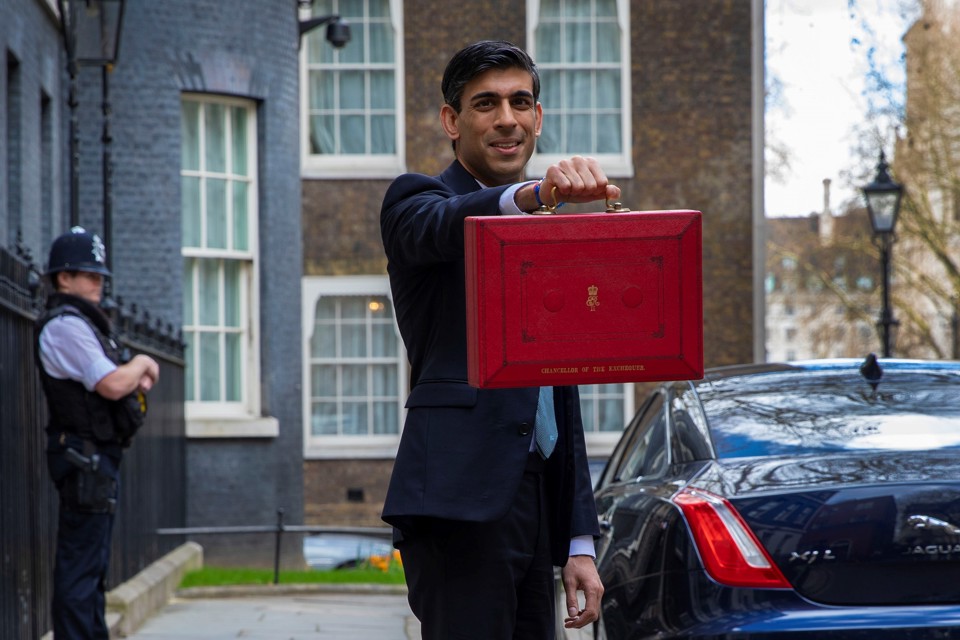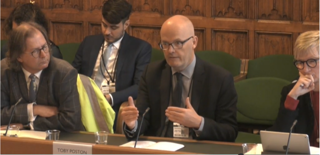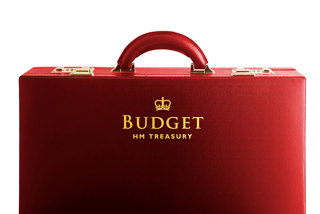The Government has announced a raft of tax and spending proposals in Budget 2021, but announcements for the fleet and leasing industry were thin on the ground.
Tim Buchan, CEO of Zenith, said: “It’s promising to see the Government’s ongoing commitment to greener transport, particularly in its continued investment in EV charging infrastructure.
“Today’s announcement represents a total £2.8bn investment in the EV sector by 2030, which shows commitment towards achieving the Government’s net zero targets.
“However, what is still needed is clarity and detail on its long-term plan for decarbonising the UK’s vehicles via taxation, grant and incentivisation.”
Buchan welcomed the freeze on fuel duty, but added: “There is no visibility on what the structure of vehicle taxation will be beyond 2025.
“Whilst this announcement is encouraging, a more comprehensive roadmap is needed so that the fleet industry can fully understand the role it plays in supporting the Government to meet its targets and can effectively prepare for a lower-carbon future.”
Gerry Keaney, chief executive of the British Vehicle Rental and Leasing Association (BVRLA), says that the Chancellor has missed an opportunity to give the industry essential clarity when it is most needed.
“At a time when the uptake of electric vehicles is ready to accelerate, the silence around areas such as benefit in kind tax rates is deafening,” he said. “This only grows fears that rates will be drastically increased down the line.
“BVRLA members had clear asks for this Budget. The Chancellor has failed to give tangible details on these asks, meaning that questions remain over what the Government’s plan is.
“The Net Zero Strategy last week marks a very positive step in the right direction; what we needed in today’s Budget was more detail. Instead, we have been given headlines that offer no clarity, no foresight and no confidence.”
Sean Kemple, managing director of Close Brothers Motor Finance, said: “We are finally starting to see the government put its money where its mouth is when it comes to investing in greener roads.
“An additional £620 million into public charging in residential areas and targeted plug-in vehicle grants will be a critical acceleration in the path to Net Zero and will help encourage drivers to transition to electric vehicle ownership.
“Investment in charging points is an infrastructural necessity if we are to embed the use of electric cars into our everyday lives. But we still have a way to go to make electric car ownership accessible, affordable, and convenient for motorists.”
Paul Hollick, chairman of the Association of Fleet Professionals (AFP), AFP, said that the freeze in fuel duty was welcome but not unexpected given the rate of petrol and diesel increases seen in recent months.
But added: "There are some areas of disappointment. The biggest of these is the absence of benefit-in-kind taxation tables for 2025-26, for which we’ve been campaigning and remain an issue for fleets embarking on electrification.
"We would also have welcomed any sign of future discussion on the Government’s future thinking on road pricing, but it appears that conversation remains some way into the future.
“In a wider sense, the good news is that the economy is a relatively good place following Covid – or at least in a better place that could’ve once been expected – although there remains a long list of significant problems, from the semiconductor shortage to the emerging impact of Brexit.”
Richard Hipkiss, managing director of Fleet Operations, also welcomed the freeze on fuel duty for the 12th year in a row.
However, he said: "This announcement is set against a backdrop of increasing pressures on fleet fuel spend, with petrol prices reaching new highs, somewhat offsetting fuel duty campaigners’ triumph over the continued freeze.
“This makes the need for stringent cost control measures and effective fuel strategies all the more critical.
“Changing priorities and ensuring the UK was a forerunner in the race to zero was clear, with a £817 million pot committed for the electrification of UK vehicles and their supply chains, on top of the £620m of additional investment recently announced for public charging in residential areas and targeted plug-in vehicle grants.
“However, the decision not to cut VAT on household energy in the face spiralling bills could potentially dampen enthusiasm for EV adoption amongst company car users.
“Whilst the impacts of the budget are yet to be seen or felt, fleets will no doubt be waiting with bated breath to see how these and other factors will affect their fleet spend and makeup over the coming year and beyond.”
Steve Nash, CEO of the Institute of the Motor Industry (IMI) says that the Chancellor’s promises for training and development, to build a stronger economy, should be commended.
“The £3.8 billion investment over the course of the current parliament in training is good news for the UK as a whole,” he said.
“However, there was a lack of detail around how the additional £2.7bn for apprenticeships up to 2025 will be applied.
“In particular, we believe that there needs to be an acceleration in the updating of apprenticeship models to reflect the new innovations in automotive, which currently relies very heavily on employer input.
“Those employer panels would certainly benefit from some additional resources to support their important work. Without this, the Government’s own ambitions in decarbonisation could be seriously undermined.”
Currently, Nash says that the apprenticeship models are not fully aligned to the evolution of electric vehicles (EVs) and other new and rapidly evolving automotive technologies.
“Yet the pace of growth in sales of EVs in particular has increased enormously in the last 12 months,” he said. “Without a properly qualified workforce, the EV revolution – which is fundamental to the government’s Decarbonisation plan - could stall.
“As important as it is to grow the pipeline of new talent through apprenticeships, we would also like to have seen some more funds directed towards helping the existing workforce gain new skills to deal with electric vehicles in particular, to avoid an impending skills gap that we have already identified.
“We look forward to working with government to help it identify the actions that need to be taken to support employer panels and help them to ensure that automotive apprenticeships keep pace with rapidly evolving technology.”
Matthew Walters, head of consultancy services and customer value at LeasePlan UK, says that, while the ongoing fuel duty freeze is welcome relief for motorists and fleets, its significance shouldn’t be overstated.
"It won’t really affect prices at the pumps, which are currently at near-record highs – and could go higher due to continuing issues around oil prices and supply,” he said.
“This Budget has left the fleet industry with more questions than answers. So many previously announced consultations – into VED for cars, into VED for vans, into a ZEV mandate, and more – have been allowed to pass without any confirmed legislative action. And just what is the government planning around road pricing, which was one of the big talking points ahead of today?
“If the fleet industry is to prepare for the future, then it needs some of these unresolved questions answering as soon as possible.”
On company car tax, Walters said that unlike his immediate predecessors, the Chancellor, Rishi Sunak, has given fleets and motorists "ample warning" of upcoming BIK rates in his previous Budgets. However, today’s Budget did not give us the rates for 2025-26 or beyond.
“With the Spring Budget due early next year, this isn’t yet an urgent concern. But we would urge the Chancellor to continue his record of transparency – and provide those rates as soon as possible, so that fleets entering into contracts today are able to plan properly for the future.”
Iryna Kocharova, head of sustainability at Lex Autolease, said: “As momentum continues to shift away from petrol and diesel, an alternatively-fuelled future can’t happen overnight.
“The affordability of electric vehicles remains a key barrier towards adoption for many small businesses and private drivers, with an ICE vehicle remaining the only option for some.
“With rising fuel prices against the backdrop of the ongoing pandemic recovery, a 12-year fuel duty freeze remains a sensible move; however, if the UK is serious about leading the EV charge, then sustained investment from policymakers which accelerates the UK’s electrification plans has to stay at the top of the agenda.”
Mike Hawes, SMMT chief executive, highlighted how the effects of the pandemic continue to hurt businesses across the sector, with supply chain disruption, skills shortages and “punitive” energy costs.
“The Budget included some significant steps, most notably in adjusting business rates to allow relief on renewable energy and the extension of the super-deduction,” he said.
“Together with the Global Britain Investment Fund which provides £817m to support the transition of automotive manufacturing and the £620m announced last week for incentives, as well as investment in charging infrastructure, these are a recognition of the importance of the automotive sector and its ability to drive innovation and exports, and to create well-paid, highly skilled, green jobs across the country.
"However, if we are to attract the investment in plant and machinery that a modern, competitive and decarbonised industry needs, a more fundamental change in business rates is still necessary - one that actually incentivises the continued investment that factories need to be at the cutting edge of operational efficiency.
“The Budget was also a missed opportunity to support the many supply chain businesses which are suffering cash flow shortages due to stoppages arising from the semiconductor shortages.”
Debbie Fox, commercial director, Epyx, said: “Fleets are facing a number of difficult issues at the moment – new car supply, problems arising from Brexit, driver shortages, the process of electrification and more.
"There was little in the Budget to help them tackle these issues directly, with the possible exception of the fuel duty freeze, but the good news is the overall economic forecast we are hearing is significantly more positive than might have been imagined when we were deep in the Covid crisis.
"I would broadly agree with the Chancellor when he says that growth is up, jobs are up and debt is down, but with the sizeable caveat that the points from which we started were in the depths of the pandemic when business activity was very low.
"Really, this is the most important news from this Budget – that following a massive, perhaps unprecedented economic shock, the situation is now relatively stable, although there remains potential for the problems we face to cause major, ongoing operational and cost difficulties.”
David Brennan, CEO of Nexus Vehicle Rental, said: "Following almost two years of uncertainty and challenges arising as a result of Brexit and the Covid-19 pandemic, today’s budget announcement highlights the importance of looking to a more optimistic future and beginning to rebuild the economy.
"Whilst we have not yet overcome the pandemic and there are likely to be some challenging months ahead, it is positive to hear that the economy is forecast to return to pre-covid levels at the turn of the year – more quickly than previously suggested. It was important to see the Government’s continued commitment to supporting the people in this country with increased investment in public services and education, to ensure that those who have been most negatively impacted by the pandemic can continue to receive the support they need.
"It’s also promising to see a renewed focus from on supporting transport upgrade projects across England to a cost of £5.7bn, with investment to support the levelling up strategy in the North of England, including Leeds where we are headquartered.
"As well as improvements to UK-wide infrastructure, the announcement of increased investment to support local transport everywhere is welcome – especially with over 50 local road upgrades, to a tune of £5bn, which will be enough to fill 1m more potholes every year.
"We have directly seen business mobility and bottom lines impacted by the damage to our road network, with many organisations needing to fork out for vehicle repair and damages caused by potholes.
"With fuel prices currently at the highest level in eight years, the cancellation of the planned rise in fuel duty should be celebrated. This will not only have a positive impact on individuals and families, but it will also benefit businesses operating large fleets – enabling them to save an estimated £30 per van for an average tank of fuel and over £120 for HGVs.
"The Government clearly recognises its continued support of the transport and logistics sector is so critical to the UK economy."
He continued: Whilst the Government continues to sign-post fleets towards a green future with mention of its net-zero commitments, it was disappointing to not hear of any increased support for the production of electric vehicles.
"Once again, enhanced financial support is still needed from the government to increase affordability of the vehicles and ensure there is suitable infrastructure in place for businesses that decide to make this important transition.
"Whilst the Government announced reduced air passenger duties and a commitment to cutting carbon emissions from aviation, there was less talk about its support to boosting electric vehicle infrastructure and connectivity of the charging hub network across the UK.
"With talks of an additional £30bn to create new green industries of the future, it would have been interesting to hear plans on how they will look to transform existing industries in this way.
"Overall, today’s Budget provided a sense of optimism from the government for the UK’s future and should provide a sense of confidence to businesses, who themselves are looking to recover and move on from this challenging period and build themselves back stronger than ever."
























Login to comment
Comments
No comments have been made yet.